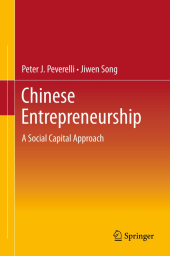 Neuerscheinungen 2014Stand: 2020-02-01 |
Schnellsuche
ISBN/Stichwort/Autor
|
Herderstraße 10
10625 Berlin
Tel.: 030 315 714 16
Fax 030 315 714 14
info@buchspektrum.de |

Peter J. Peverelli, Jiwen Song
(Beteiligte)
Chinese Entrepreneurship
A Social Capital Approach
2012. 2014. xiv, 174 S. 235 mm
Verlag/Jahr: SPRINGER, BERLIN; SPRINGER 2014
ISBN: 3-642-44416-4 (3642444164)
Neue ISBN: 978-3-642-44416-6 (9783642444166)
Preis und Lieferzeit: Bitte klicken
This book examines key Chinese entrepreneurs to reveal how their entrepreneurial identity has emerged at the cross section of other identities. It applies a new method of social network analysis to unravel the social embeddedness of Chinese entrepreneurs.
Entrepreneurship is hot. China is hot. Combining these two concepts could therefore be a dangerous act, as it may cause overheating. Chinese entrepreneurs are indeed the subject of a rapidly growing body of literature, academic and popular. However, the bulk of it tends to focus on a few aspects. There are the biographies of ´famous´ entrepreneurs. While informative, these are usually of a non-academic nature. Academic studies tend to focus on the political and economic environment in which present day Chinese entrepreneurs have to operate. Both types of publications slight the entrepreneurial identity. This study aims at filling this gap with its core question: why do some people become entrepreneurs? The authors have analysed the life stories of a number of Chinese private entrepreneurs to reveal how the entrepreneurial identity of each of them has emerged at the cross section of an number of other identities. This book therefore contributes to a better understanding of Chinese entrepreneurship and the study of entrepreneurship in general.
Defining the problem.- Introduction.- Theory.- The environment of chinese entrepreneurs.- Case histories.- Real estate entrepreneur Wang.- Textile spin-off Niu.- LangLib - an online English study community.- Home renovator Cheng.- Migrant talor Yuan.- Restaurant entrepreneur Mr. B.- Less successful entrepreneur Meng.- Elements of entrepreneurial identity.- Family.- Home region.- Friends.- Government.- Conclusions.- Acknowledgements.- References.- Index.


